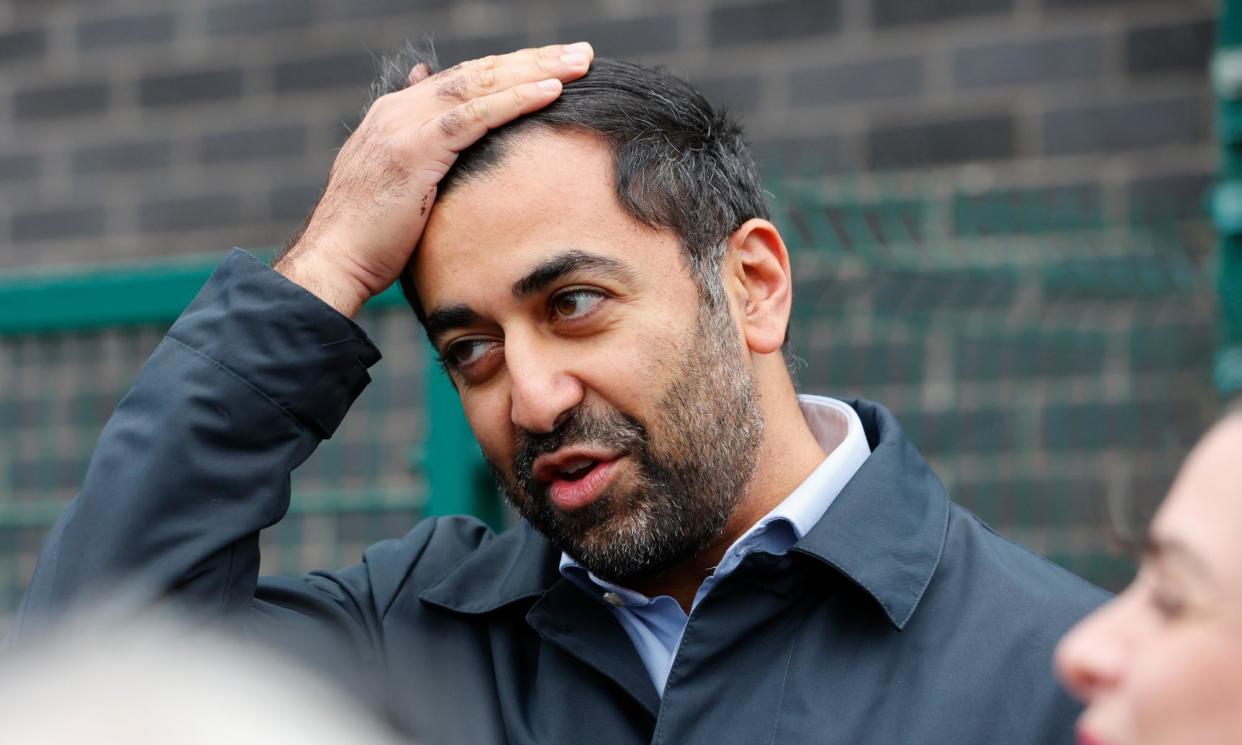Humza Yousaf inherited a deeply fractured SNP – as will his successor

When Humza Yousaf was narrowly elected leader of the SNP last March, it was after a bruising leadership contest that exposed profound divisions in the party over LGBTQ+ rights, Westminster’s veto of Holyrood law, and environmental and economic policy.
Indeed, it could be said the end of the SNP’s partnership with the Greens, and the downward spiral of chaos that ended with Yousaf’s resignation little over a year later, was telegraphed by the fault lines that emerged back then, setting the scene for the myriad conflicts that Yousaf was forced to manage – and ultimately failed to resolve – as leader.
Those fault lines remain just as stark and will demand the new leader’s immediate attention. Just as crucial, in an election year when the SNP is forecast to take heavy losses at the hands of a resurgent Scottish Labour party, is how to communicate that the party is genuinely focused on voters’ concerns as well as rebuilding cross-party trust at Holyrood in minority government.
As one senior SNP MSP puts it: “The litmus test for a new leader will be the continuing fault line in the party on social policy. In a sense, bringing in the Greens masked a bigger issue within the party that now has to be resolved for the SNP to move forward.
“Is the party going to remain a broad church that has appeal to middle-class and working-class voters, left and right of centre, bringing together people with a range of views but with the common aim of independence? That’s been entirely possible for a very long time and it’s been a very successful formula.”
As support coalesces around John Swinney, what is clear is a desperation for leadership that many feel has been lacking over the past year. Swinney is known as much for his steeliness as for his quiet charm, and enjoys an unassailable familiarity with internal loyalties and fallings out.
“It is genuinely hard to think of anyone else who is strong enough and serious enough,” says one colleague.
“Every time he speaks, the whole Holyrood group listens, no matter what faction,” explains another MSP.
While activists and elected members believe the party has benefitted from Yousaf’s more inclusive leadership style, in comparison with Sturgeon, there has been an increasing frustration at his desire to be all things to all people. In the earlier days of his tenure, there was sympathy as he battled crises not of his own making – in particular, the ongoing Police Scotland investigation into party finances – but latterly there were repeated complaints about a sense of drift, with the promised big ideas from his leadership platform never materialising.
Yousaf faced significant rebellions within his own party. Last October, the former SNP minister Ash Regan defected to Alex Salmond’s Alba party in protest at the SNP’s stance on gender recognition policy and lack of progress on independence. In an excruciating irony, she would have had the deciding vote in the motion of confidence in Yousaf.
Restive backbenchers grouped around Kate Forbes, who came second to Yousaf in the leadership contest, and outspoken critics such as Fergus Ewing, one of the party’s longest-serving MSPs, who declared Yousaf to be a “doormat” to the Greens as he was suspended for not supporting the Green co-leader Lorna Slater in an earlier vote of confidence.
There is also a sense that Yousaf’s treatment of the Greens was part of a pattern of making big decisions very quickly with little consultation beyond a small band of advisers. Another being the council tax freeze – his response to the SNP’s crushing defeat by Labour in October’s Rutherglen byelection, which infuriated local authority leaders and appeared to breach commitments in the Bute House agreement to progressive taxation.
There is also some anger building among the Holyrood group with the party’s Westminster leader, Stephen Flynn, who returned to Edinburgh last week to advise Yousaf immediately before his crunch meeting with the Greens. Some MSPs blame him for encouraging the first minister to rip up the deal in the brutal manner he did and putting the interests of his MPs – who were concerned that Yousaf’s seeming focus on identity issues was causing problems on the doorstep, when voters wanted to talk about cost of living – ahead of Holyrood.
The common view among the Holyrood SNP group is that people are upset about how the Greens were treated but accept it was time to end the agreement, and exasperated with Yousaf for not recognising the consequences, appearing dumbfounded with the Greens’ reaction.
The Guardian understands that senior SNP figures other than the first minister reached out to the Greens over the weekend to secure their commitment to abstain at the very least in forthcoming confidence votes as long as Yousaf himself stood down. After Yousaf’s announcement on Monday morning, the Greens confirmed they were “not interested in bringing down the Scottish government”.
By then, Yousaf was aware that the numbers for the confidence vote were impossible – the Guardian understands that any deal with Regan, which would in effect deliver power to the Scottish government’s most vicious critic, the former first minister Alex Salmond, would have resulted in a number of his cabinet walking out. Yousaf was clear in his resignation speech that he would not “trade in my values or principles or do deals with whomever simply for retaining power”.


